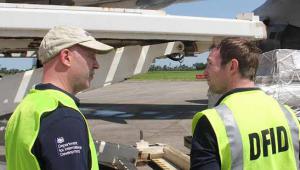768x424-Downtown-lagos-nigeria-iStock_000048812356_Full.jpg

Developing African nations like Nigeria, one of DFID's key partner countries, are among the biggest losers of tax avoidance.
Britain’s Department for International Development also let UK government tax policies that harm developing countries go unchallenged, while its cross-government initiatives raise significant value for money concerns, a review found.
The report, by the UK’s Independent Commission for Aid Impact, which scrutinises taxpayer-funded UK aid, looked at DFID’s contribution to tackling tax avoidance and evasion, which hurt developing nation economies disproportionately.
The International Monetary Fund estimates the practices cost developing countries $200bn every year – revenue sorely needed for public services, poverty reduction and development.
A key part of DFID’s work in this area is to ensure developing countries participate in international tax initiatives, and that these initiatives benefit them and reflect their needs and concerns.
Richard Gledhill, lead ICAI commissioner for the review, highlighted that DFID and the UK government committed to driving international tax policy to address global challenges and reduce poverty, most noticeably in its “beyond aid” aid strategy.
“But despite these ambitions, DFID has too often supported a ‘top down’ approach, which has failed to give developing countries a voice when crucial decisions are taken,” he added.
ICAI’s report concluded that developing countries only rarely had their concerns included on agendas, and had little practical influence over international processes.
A number of key issues for the world’s poorer nations, such as bilateral tax treaties, which often result in wealthier countries winning rights to tax income that others argue rightly belongs to a developing country, never made it on to major international tax agendas.
Even at home, ICAI said DFID did not do enough to ensure the interests of developing countries were taken into account by UK government tax policies. Many are indirectly harmful to developing nations, including participation in unfair bilateral tax treaties, tax competition, and a failure to bring British Overseas Territories, some of the world’s most popular tax havens, in line.
Charlie Matthews, head of advocacy at ActionAid, said ICAI’s findings confirm that UK aid’s approach to tackling tax avoidance is “incoherent, ineffective and in danger of failing to deliver for the world’s poorest”.
“Instead of standing by as the UK pushes tax reforms designed to meet the needs of rich countries, DFID needs to listen to poorer countries and ensure efforts to reform the tax system are informed by their needs.”
Developing countries often need capacity support to implement high level, international tax reforms and standards. ICAI said DFID did provide this, with some success, but programmes were often too short term to really add value and did not take into account the shortcomings of domestic systems.
Other value for money concerns stemmed from a partnership with HM Revenue and Customs, which saw the tax agency get £1.2m to train new staff to fill roles left empty by those deployed overseas to work on DFID capacity building programmes. But HMRC never achieved more than half of its planned deployment.
ICAI highlighted that such cases reflect a key value for money risk as the UK’s aid budget is spread more widely around different government departments.
Overall, ICAI gave DFID an “amber-red rating”, indicating unsatisfactory achievement in most areas, namely in attending to the needs and priorities of DFID’s partner countries. While the rating allows for some positive elements, it suggests improvements are needed for UK aid to have a positive impact.
A DFID spokeswoman said: “International tax evasion is a menace that can hurt the world’s poorest and hold back developing economies.
“Through its presidency of the G8 and through the G20, the UK has pushed forwards an international agenda for tackling global tax evasion. As ICAI rightly recognises, DFID has helped developing countries benefit from the new international tax standards and this has been underpinned by effective cross-government collaboration.
“The UK has a strong record of supporting and mentoring developing countries in this field and will continue to do so.”













